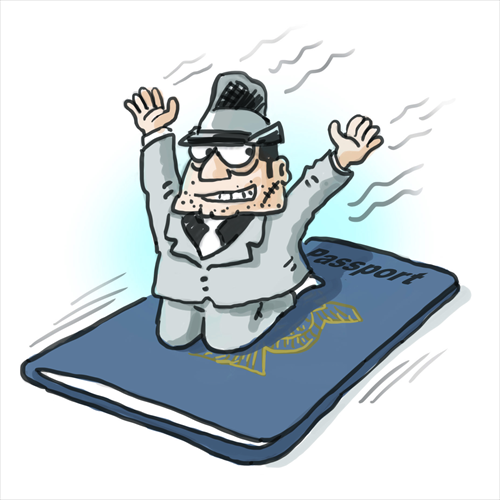 Top 100 beauties in the world!
Top 100 beauties in the world!
 Gallery: Who is the most beautiful one?
Gallery: Who is the most beautiful one?
 If you like autumn, put your hands in the air!
If you like autumn, put your hands in the air!
 Fan Bingbing's "Queen style" in new play
Fan Bingbing's "Queen style" in new play
 Lingerie show at 2014 Miss China
Lingerie show at 2014 Miss China
 J-10 fighters show aerobatic stunts in smog-free sky
J-10 fighters show aerobatic stunts in smog-free sky
 Charming contestants of Shanghai Int’l Model Contest
Charming contestants of Shanghai Int’l Model Contest
 Most amazing chi-pao beauties
Most amazing chi-pao beauties
 7 deadly animal attacks
Russia to launch 70 Proton rockets by 2020: official
7 deadly animal attacks
Russia to launch 70 Proton rockets by 2020: official

Illustration: Liu Rui/GT
One tasty result of talks between Chinese President Xi Jinpingand US President Barack Obama during the Asia-Pacific Economic Cooperation (APEC) Economic Leaders' Meeting recently in Beijing was an agreement to dramatically extend the validity of visas. The Chinese citizens will now be able to get business and tourist visas that are good for 10 years and student visas for five years. Beijing reciprocated the gesture and announced it will offer US citizens the same privileges.
For Chinese in China and in the US, the news was thrilling. This was reflected in overwhelmingly positive feedback all over the Chinese-language media here and there and on the Internet. Some even compared a 10-year visa to a green card, given the freedom of traveling back and forth the holder enjoys.
I totally understand the joy. As a former international student who came to the US in 2000, I clearly remember the emotional torture my friends and I went through in those days because of our sad six-month visas. There were people who went back to visit their parents between semesters and were then denied a visa renewal. So they were stuck back in China without being able to finish their studies in the US. No one knew how often such nightmares happened. But horror stories like this certainly traveled quickly. Many of us decided not to risk it and avoided going back to China for years.
When the airline industry in the US was facing a downturn and major carriers were plummeting into bankruptcy, I remember thinking if the Chinese students in the US had long-term visas, we might be able to rescue them single-handedly.
Of course, the airline industry was not the only thing in Obama's mind when he initiated the visa extension. But economic forces certainly played a decisive role. No one can ignore the rapidly growing wealth in China. The more Chinese travel to the US and the more frequently they do so, the more economic benefits they'll bring.
But one thing both China and the US need to bear in mind is that ordinary businessmen, tourists and students are not the only ones who are overjoyed by the possibility of long-term visas. For those who get their power and money via illicit means, or those who might be doing so in the future, a long-term visa also offers a dream backup. When such people sense that investigators are closing in, they can, to borrow a popular phrase that's used frequently online in reference to the visas, "depart whenever you like."
This brings up an old issue between the US and China. There is no extradition treaty between the two countries. In recent years, many corrupt Chinese officials and businessmen went to hide in the US. According to statistics from China's Ministry of Public Securitycited by Chinese media earlier this year, there were about 150 Chinese economic fugitives who had escaped to the US and only two of them were brought back in the previous 10 years.
And the US isn't without similar problems in China. Steven Ng-Sheong Cheung, a Hong Kong-born American economist who was indicted for tax fraud in the US in 2003, still lives a worry-free life in China, so does Pei-Shen Qian, the China-born American artist who was indicted in April for his involvement in the forgery of art works.
Of course, a long-term visa does not automatically allow its holders to stay in the country they have entered. Nor does it allow them to work. But as long as they can escape the tightening net in their home countries and reach "dry land," it is easier to overstay in a foreign country than go back to the punishment waiting in their own.
And although an extradition treaty seems more and more to be in the mutual interest of the two nations, to reach an agreement on this is much harder than on the visas. A prerequisite of such a treaty is that the countries involved have to generally accept the validity of each other's justice systems. For China and the US, the gap is due to ideological differences, which could take a very long time to close.
 Hot girls at motor show
Hot girls at motor show  Official trailer of Y-20
Official trailer of Y-20 Photos: Xi Jinping in Fujian
Photos: Xi Jinping in Fujian Standard faces for each countries
Standard faces for each countries China-made military transport aircraft gets ready
China-made military transport aircraft gets ready World Pole Dance Championship in China
World Pole Dance Championship in China Shocking! Photos of Chinese fighters revealed
Shocking! Photos of Chinese fighters revealed 59-year-old Liu Xiaoqing still looks stunning
59-year-old Liu Xiaoqing still looks stunning  In pics: PLA stages live-fire drill in NE China
In pics: PLA stages live-fire drill in NE China  Top 10 most dangerous jobs in the world
Top 10 most dangerous jobs in the world  Top 10 fifth generation jet fighters in the world
Top 10 fifth generation jet fighters in the world Top 10 Chinese goddesses
Top 10 Chinese goddesses  Top 20 hottest women in the world in 2014
Top 20 hottest women in the world in 2014 Top 10 pure beauties in showbiz
Top 10 pure beauties in showbiz  Top 10 world's highest-paid models 2014
Top 10 world's highest-paid models 2014 The most gorgeous Chinese women
The most gorgeous Chinese women Top 10 most handsome faces in Asia
Top 10 most handsome faces in AsiaDay|Week|Month